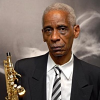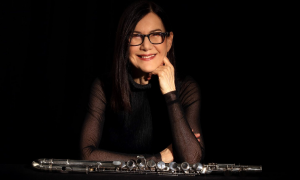Home » Jazz Articles » Interview » Scott Thomson Takes Over at FIMAV: Seeking a Balance Bet...
Scott Thomson Takes Over at FIMAV: Seeking a Balance Between Continuity and Change

Courtesy David Lobato
I want the festival to reflect my artistic vision but within a continuity with what has been established throughout the history of the festival, and this is a very fine balance to try to achieve.
When the festival announced that the new artistic director would be
Scott Thomson
tromboneThomson, a youthful 49-year-old with a perpetually positive demeanour, came to music late. Following the 1999 Guelph festival, during which he drove the shuttle van for musicians from the Toronto airport to Guelph, Thomson dropped out of university and spent the winter in Burkina Faso and Mali, where he found the audience experience much more participatory than in North America. He decided that he wanted to make music, so on his return, he purchased a pawnshop trombone and gave himself five years to make it or break it musically.
"Twenty-five years later, I'm still playing the trombone," Thomson said.
"Along the way, I joined bands and got involved with different initiatives that drew out more of my interest in producing and presenting. That started especially with the Association of Improvising Musicians of Toronto, of which I was one of the founding board members along with

Joe Sorbara
drumsb.1977

Nick Fraser
drumsb.1976
Rob Clutton
bass, acousticb.1966
Thomson cites the experience of working with

Anthony Braxton
woodwindsb.1945
After moving to Montreal in 2010, Thomson dropped his organizational activities to focus on composing and playing, but he started becoming active again as an organizer in 2016, when he and Montreal bassist/bandleader
Nicolas Caloia
bass
Roscoe Mitchell
saxophoneb.1940
"That was a wonderful project, but it was also very difficult because Ken Aldcroft died about a month before that," Thomson said. "Ken was a dear friend and an important collaborator for me. It threw me into a period of reflection about what I wanted to do. You don't always have time, right? So you should do the things that are important. I realized, based on my experience, especially in Toronto, that I should be more involved in organizational activities, because it seems to be a skill of mine."
"When it was announced that Michel and Joane [Vezina] were going to retire, I thought about who would be a good candidate for that job. In terms of sensibility and experience—not just programming but general directorship—who would have the capacity, the freedom to move to Victoriaville, or to be there the majority of the time, which I am, to be able to speak French, have a good working knowledge of Quebec's history in musique actuelle—the list is quite short. Moreover, I have the experience of replacing the founding artistic director in Guelph, so I've lived through that already. I've enacted it, which presented a whole bunch of challenges as well, so I knew what it would take, and that process is still very much ongoing."
One of the issues might be that for a founding director to hand over the reins of the festival would be like having someone adopt one of his or her children.
"I don't see it that way," Thomson said. "I understand why they might, but I don't see it that way because it is in a sense very much theirs, but it can't only be theirs. It has to be for them and the people around them. If they were to think about it that way then they would expect that for it to survive, it would need to change. How much it would change would depend on the person, but it can't be exactly the same. It's impossible, and it would be unreasonable to expect. So the metaphor of adopting a child has a little bit too much of the continuity, where that change would not be reasonable. And I think it needs to be reasonable. And they know that as well. But I know how hard it was for Ajay. I know how hard it is for Michel. I'm sympathetic to that. I want it to survive. I want it to thrive. I want the festival to reflect my artistic vision but within a continuity with what has been established throughout the history of the festival, and this is a very fine balance to try to achieve. And there are people around me within the various communities who may have other expectations, so it's a question of working as carefully as possible to achieve that balance and knowing that not everybody is going to be 100-percent happy all the time. Because people care about it. They're invested in it. I want to respect that but also be cognizant of the fact that there'll be some excitement, there'll be some questioning, there'll be a little bit of disappointment here and there. I think that's part of the transition process. People are invested, and it shows that it matters."
Reading the festival program like tea leaves telling us the future of the music is a popular conversation trope for the people who go to Victoriaville regularly. Reading the tea leaves of the program for the 2024 year's edition, which runs from May 16-19, it appears that continuity rather than change prevails, with perhaps more emphasis on acoustic and electroacoustic music and less on electronics than we have seen in past editions. There are performances by Roscoe Mitchell (solo),

Nate Wooley
trumpetb.1974

John Butcher
saxophoneb.1954
Sophie Agnel
drums
Joëlle Léandre
bassb.1951
The fact that Thomson has experienced Victo as both a performer and audience member will inevitably influence his direction of the festival. Even long-time festival attendees, people who come back year after year from places like New York City, Arizona and Texas, have their complaints and disappointments that they discuss. But that is an integral part of the experience of a festival that presents 19 concerts over four days with no overlaps so that everyone can see all the performances. Not everyone is happy all the time.
"And I've been one of those people," Thomson said. In fact, he has performed at Victoriaville on eight occasions, something that will not happen again as long as he directs the festival. "I've played concerts that people loved, and I've played concerts that people were indifferent to. But that kind of exchange—just to sit around after a concert and talk about what was good about it, what was maybe not as good about it, that's what makes it festive. It's a core element of the experience. This festival offers a different kind of social life around the music that is very special."
Tags
Interview
Mike Chamberlain
Canada
Montreal
Festival International de Musique Actuelle de Victoriaville
Scott Thomson
Guelph Jazz Festival
Ken Aldcroft
Joe Sorbara
Nick Fraser
Rob Clutton
anthony braxton
Nicolas Caloia
Roscoe Mitchell
nate wooley
John Butcher
Sophie Agnel
Joelle Leandre
Don Malfon
Amma Ateria
Comments
PREVIOUS / NEXT
Support All About Jazz
 All About Jazz has been a pillar of jazz since 1995, championing it as an art form and, more importantly, supporting the musicians who make it. Our enduring commitment has made "AAJ" one of the most culturally important websites of its kind, read by hundreds of thousands of fans, musicians and industry figures every month.
All About Jazz has been a pillar of jazz since 1995, championing it as an art form and, more importantly, supporting the musicians who make it. Our enduring commitment has made "AAJ" one of the most culturally important websites of its kind, read by hundreds of thousands of fans, musicians and industry figures every month.
Go Ad Free!
To maintain our platform while developing new means to foster jazz discovery and connectivity, we need your help. You can become a sustaining member for as little as $20 and in return, we'll immediately hide those pesky ads plus provide access to future articles for a full year. This winning combination vastly improves your AAJ experience and allow us to vigorously build on the pioneering work we first started in 1995. So enjoy an ad-free AAJ experience and help us remain a positive beacon for jazz by making a donation today.

Montreal
Concert Guide | Venue Guide | Local Businesses
| More...






 Buy Now
Buy Now























